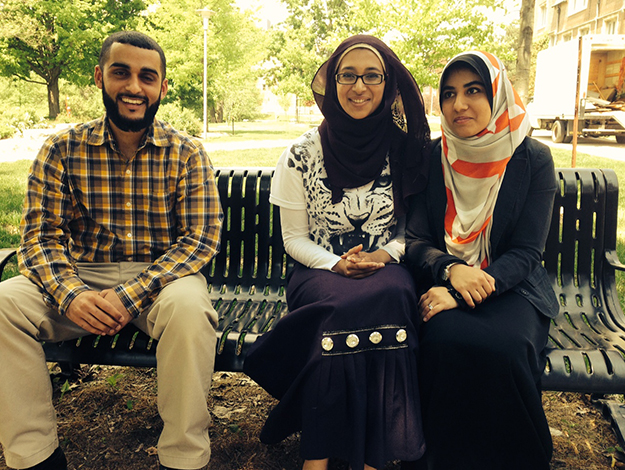Grad students put science and Islam together to promote good mental health

'When we said there’s treatment and help available for you, they were so relieved,' said Kashmala Qasim, a member of the Healthy Active Living group. From left to right: Asim Siddiqi, Naushin Sholapur and Qasim.
Two McMaster graduate students were wrapping up a community presentation on mental health when members of the audience began approaching them, in tears.
The audience had just experienced an eye-opening discussion where some had learned that symptoms they had battled privately were in fact the hallmarks of recognized conditions such as depression and anxiety, and that treatment was readily available.
For the first time, someone had told them they were not alone and that they were not to blame.
The presentation had been organized by a group of McMaster graduate students who for the past year have been visiting Muslim organizations from Hamilton to Toronto to talk about healthy active living in a religious and cultural context.
“When we said there’s treatment and help available for you, they were so relieved,” said Kashmala Qasim, a member of the group. She and her fellow presenter pointed out that there were religious supplications available for anxiety and depression, in conjunction with psychotherapy. “We put science and Islam together and they were really relieved.”
The group is operating on a recently-extended grant from SPICES – Student Proposals for Intellectual Community & Engaged Scholarship – a program operated by the School of Graduate Studies that encourages graduate students to initiate interdisciplinary projects that connect their studies to the community.
“We want to connect people to research, so it’s easier for them,” said Siddiqi. “We see the need that is out there, and if we can get information out there, it helps everybody grow, be aware of the problems that are out there and mitigate the risks.”
The Healthy Active Living group started with just three people: Qasim, Naushin Sholapur and Asim Siddiqi. Qasim has completed her master’s degree in Neuroscience, while Sholapur (Health Research Methodology) and Siddiqi (Neuroscience and Engineering Design) are working on theirs. The three had all previously worked as volunteers helping undergraduate Muslim students.
Despite the intensity of their studies, they also felt compelled to use their access to research and knowledge at McMaster to help people who needed it in the broader community. Sometimes accompanied by experts in particular fields, they talk to children adults and seniors alike about subjects related to nutrition, fitness and mental health, always to eager audiences.
Their group has made presentations to groups as small as 25 and as large as 300, in mosques, schools and other venues, using an approach that aligns academic research and knowledge with Muslim customs and values. They fulfill their ambitious mandate by working with a team of undergraduate volunteers.
“The Islamic community is very diverse in terms of ethnicity, demographics and socio-economic status. But the one thing that connects this community is that they make a lot of decisions and based on religious scripture,” said Sholapur. “When we talk about healthy active living, it’s very important to contextualize it in that framework.”
Their presentations offer ways to resolve the apparent conflict between the Islamic requirement for public modesty and the benefits of swimming, for example, or to overcome the nutritional challenges of observing Ramadan, a full month of not eating or drinking liquids between sunrise and sunset.
The demographics of the Muslim community in Canada are skewed toward newcomers and first-generation Canadians whose families are adapting to life in a new country, a transition that can get stalled without help, say the members of the group.
Many do not realize, for example, that there are Muslim therapists and counsellors who understand their specific cultural circumstances and can treat them in a comfortable context. They see their SPICES project as a major exercise in knowledge translation, and say that McMaster’s support lends tremendous credibility to their work.
“We want to connect people to research, so it’s easier for them,” said Siddiqi. “We see the need that is out there, and if we can get information out there, it helps everybody grow, be aware of the problems that are out there and mitigate the risks.”
Members of the group are available by email at spices.healthyliving@gmail.com.
